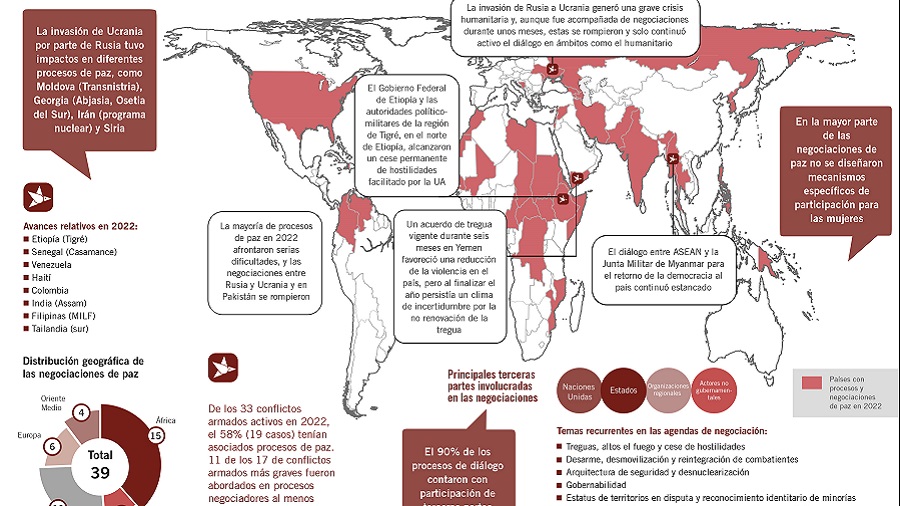Thirty-nine peace processes and talks took place in 2022
The UAB's School of Culture of Peace (ECP) recently published its Peace Talks in Focus 2022. Report on Trends and Scenarios yearbook, in which it gathers information on the 39 peace processes and talks which took place in 2022, a year marked by the conflict between Russia and Ukraine and its consequences.

According to the report, the Russian invasion "dismantled" the negotiation process that had been underway in the wake of the conflict in eastern Ukraine since 2014. But the crisis also had an impact on "the evolution of an important part of the peace negotiations", especially in Europe and the Middle East, due to the "enormous deterioration" of relations between the Russian executive and numerous governments of other countries. Russian diplomacy "tried to maintain a prominent role in various processes", but its presence had "a negative influence in different contexts".
The ECP also highlights milestones such as the truce reached in Yemen, the permanent cessation of hostilities in the Tigray region of Ethiopia and the ceasefires between Armenia and Azerbaijan, the TTP Taliban group in Pakistan, and those signed between Ukraine and Russia for humanitarian reasons. There were also rapprochements, pacts and progress of various kinds in Senegal (Casamance), Chad, Haiti, Venezuela, Colombia, Thailand and the Philippines. It is also recalled that the process in Afghanistan, broken off in 2021 with the arrival of the Taliban to power, led to a new dialogue in Pakistan "which had no continuity at the end of the year". In addition, "negotiations between Palestine and Israel were not counted, given their persistent stalemate for more than a decade and the exhaustion of the two-state formula in a context of Israel's persistent policies of employment, annexation and apartheid".
In terms of gender, "no specific mechanisms for women's participation were designed in most negotiations, and the issues of gender and recognition of the rights of women and the LGTBIQA+ population were largely left out of the negotiating agendas". However, some agreements reached during 2022 included "specific clauses" albeit in a "very limited" way: Sudan and South Sudan, for example, committed to "women as agents of change in peacebuilding efforts and inter-community dialogues", and the agreement in Tigray called on parties to the conflict to "condemn any acts of sexual and gender-based violence", among others, and to take into account the needs of "vulnerable groups" in the provision of humanitarian aid.
Africa, the continent with the most negotiations
Of the 39 peace processes and negotiations, nine were international in nature. In countries such as India, Sudan and the Philippines, more than one process is taking place simultaneously. Africa is the continent with the most, fifteen, followed by Asia (fourteen in total, four of them in the Middle East), Europe (six) and the Americas (four). The 39 processes exceed the 37 in 2021, but remain below previous years, when there had been as many as fifty. In all cases, state governments were one of the negotiating parties, and in 35 of them a third party was involved. Nineteen of the processes covered by the yearbook were active armed conflicts during 2022, while fourteen conflicts were ongoing without any negotiations.
The UAB, with Sustainable Development Goals
Peace, justice and strong institutions